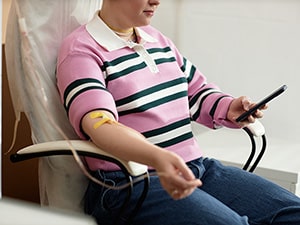Lisocabtagene Maraleucel Approved for Aggressive Lymphoma
The CAR T-cell therapy is now approved for some patients with relapsed/refractory mantle cell lymphoma.
The U.S. Food and Drug Administration (FDA) has approved lisocabtagene maraleucel (Breyanzi) for the treatment of adult patients with relapsed or refractory mantle cell lymphoma (MCL) who previously received two or more lines of systemic therapy, including an inhibitor of Bruton’s tyrosine kinase (BTK).
Lisocabtagene maraleucel is a chimeric antigen receptor (CAR) T-cell therapy, a type of immunotherapy in which a patient’s own T cells (a type of immune cell) are isolated, genetically engineered to target cancer, and then reinfused into the patient. Lisocabtagene maraleucel targets the CD19 protein that is highly expressed by malignant B cells, including those that comprise MCL.

Lisocabtagene maraleucel was approved to treat large B-cell lymphoma in June 2022, chronic lymphocytic leukemia and small lymphocytic leukemia in March 2024, and follicular lymphoma in May 2024.
The approval for MCL was based on results from TRANSCEND-MCL, a single-arm cohort within the TRANSCEND-NHL-001 open-label, multicenter, nonrandomized phase I clinical trial. The cohort enrolled patients with relapsed or refractory MCL who had received at least two lines of systemic therapy that included a BTK inhibitor, an alkylating chemotherapy, and an anti-CD20 agent.
Among 68 evaluable patients, 85.3% experienced a response to the therapy, and 67.6% experienced a complete response. Responses persisted for a median of 13.3 months.
The recommended dose for lisocabtagene maraleucel is 90×106 to 110×106 viable CAR T cells administered two to seven days after chemotherapy pretreatment, which depletes the patient’s existing immune cells.
The prescribing information for lisocabtagene maraleucel includes a boxed warning for fatal or life-threatening cytokine release syndrome, neurologic toxicities, and secondary blood cancers.
MCL is an aggressive type of non-Hodgkin lymphoma that develops in the lymph nodes and commonly spreads to other parts of the body. According to federal statistics, it was estimated that 80,620 individuals would be diagnosed with non-Hodgkin lymphoma and 20,140 patients would die of the disease in the United States in 2024.
The FDA rendered its decision on May 30, 2024.